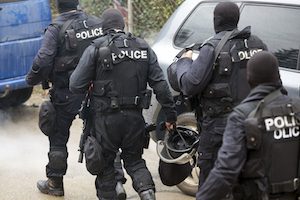 Although police officers are confronted with potentially dangerous situations on a daily basis, they are tasked with treating all members of the general public with the dignity and respect they deserve. Police officers must also ensure that they do not use more force than what is reasonably necessary under the circumstances. Using more force than necessary—or excessive force—can sometimes result in a police brutality lawsuit being filed.
Although police officers are confronted with potentially dangerous situations on a daily basis, they are tasked with treating all members of the general public with the dignity and respect they deserve. Police officers must also ensure that they do not use more force than what is reasonably necessary under the circumstances. Using more force than necessary—or excessive force—can sometimes result in a police brutality lawsuit being filed.
If you are the victim of excessive force by a police officer and have suffered an injury or injuries in the process, you might be eligible to file a lawsuit against the at-fault police officer and/or police department.
The Michigan police brutality lawyers at Thurswell Law are available to represent individuals who have been injured in some way, as a direct result of misconduct by a police officer. Contact us today to find out if we might be able to assist you in your case.
What Does Excessive Police Force Mean?
When detaining a suspect or making an arrest, police officers may not use an excessive amount of force. However, determining what amounts to excessive force under the circumstances is oftentimes a very fact-sensitive inquiry. Some incidents involving a particular police officer’s use of force may constitute police brutality, while others may not.
Generally speaking, a police officer is permitted to use a reasonable amount of force when making an arrest that is proportionate to the amount of force that the suspect is exercising toward the officer. A police officer is only allowed to use deadly force if the suspect threatens the officer with serious bodily harm—or with deadly force.
Fortunately, many police encounters with the public are captured on videotape, and private citizens may use their cell phone cameras to record a police encounter. In cases of alleged police brutality, those recordings can be powerful evidence in court and could be used to demonstrate that a police officer used an excessive amount of force under a particular set of circumstances.
A new law has police departments across Michigan researching body and dash cams. Deputy chiefs and police chief are on record as supporting them for their department. Meanwhile, Equature is developing a way to see first responders and their activities in real-time.
In police brutality cases that make it to trial, the question of whether a police officer used excessive force is oftentimes a jury question. In other words, the jury must consider what a hypothetical reasonable police officer, with that officer’s level of training and experience, would have likely done under the same or similar circumstances.
The Michigan police brutality lawyers at Thurswell Law can review any evidence in your case, as well as any available video footage, and determine whether a police officer likely used excessive force against you.
Types of Police Brutality
Police brutality and excessive force in Michigan can take a variety of different forms. Some common examples of police brutality and misconduct include the following:
- Unnecessarily beating a person who is not unlawfully resisting arrest
- Assault and battery
- Unlawful searches and seizures
- Using a Taser on a victim without provocation
- Shooting a person without cause
- Beating someone who is not unlawfully resisting arrest
- Using police equipment, such as a club or a flashlight, to injured someone without provocation
- Punching the alleged victim or placing him or her in a chokehold without the necessary provocation
- Killing a person without a just cause
The experienced Michigan police brutality lawyers at Thurswell Law can determine whether an officer likely used excessive force under the circumstances.
Under What Basis Can a Police Brutality Victim Sue?
Whenever there are allegations that a police officer used excessive force, there is typically a thorough investigation undertaken by the police department. Sometimes, an outside police agency—or even the United States Department of Justice—may decide to begin an independent investigation into the matter.
The alleged police brutality victim could file a lawsuit if the evidence shows that the officer used force that was excessive under the circumstances, or that this force was not required in order for the officer to protect the public or to make an arrest.
In some instances, the victim of the excessive force could allege that the officer violated his or her constitutional rights—specifically, the Fourth Amendment to the United States Constitution. Moreover, under Section 1983 of the United States Code, the victim could file a lawsuit directly against the offending police officer, the police agency, and/or the city and county government who operate the police department and who employ the officer.
A victim of police brutality could also file a lawsuit against the offending officer for assault and battery, as well as for gross negligence and other violations of Michigan state law. The state police, for example, have an extensive policy that limits how much force officers can use, requires documentation and reporting by officers when they use force, and mandates officer training from certified instructors.
Available Compensation in Police Brutality Cases
Victims of police brutality—and in particular shooting victims—may be eligible to pursue compensation for the injuries they sustain during the altercation in question. Specifically, the injured victim could pursue compensation for all of the following:
- Pain and suffering which the victim incurred at the time of the incident and going forward
- Shock and fright resulting from the incident
- Post-traumatic stress disorder and related psychological injuries
- Permanent disfigurement, including scarring
- Past, present, and future lost wages
- Inability to work
- Death (i.e., via a wrongful death lawsuit)
Our legal team can help you pursue the damages you deserve arising from the incident in question.
Talk to a Michigan Police Brutality Lawyer Today
Police brutality incidents can result in serious injuries—all of which could be avoided with proper police training and experience. If you or someone you love has been injured as a result of excessive force used by a police officer, you may have a valid legal claim against both the police officer, as well as the police department that employees the officer.
When it comes to suing local governments and/or their employees, time may be of the essence. If you are interested in pursuing a police brutality lawsuit, you should look no further than the experienced lawyers at Thurswell Law. Our legal team can put their experience to work and fight for your constitutional right to recover compensation.
To schedule a free consultation or case evaluation with a Michigan police brutality lawyer, please call us at (248) 354-2222 or contact us online.







